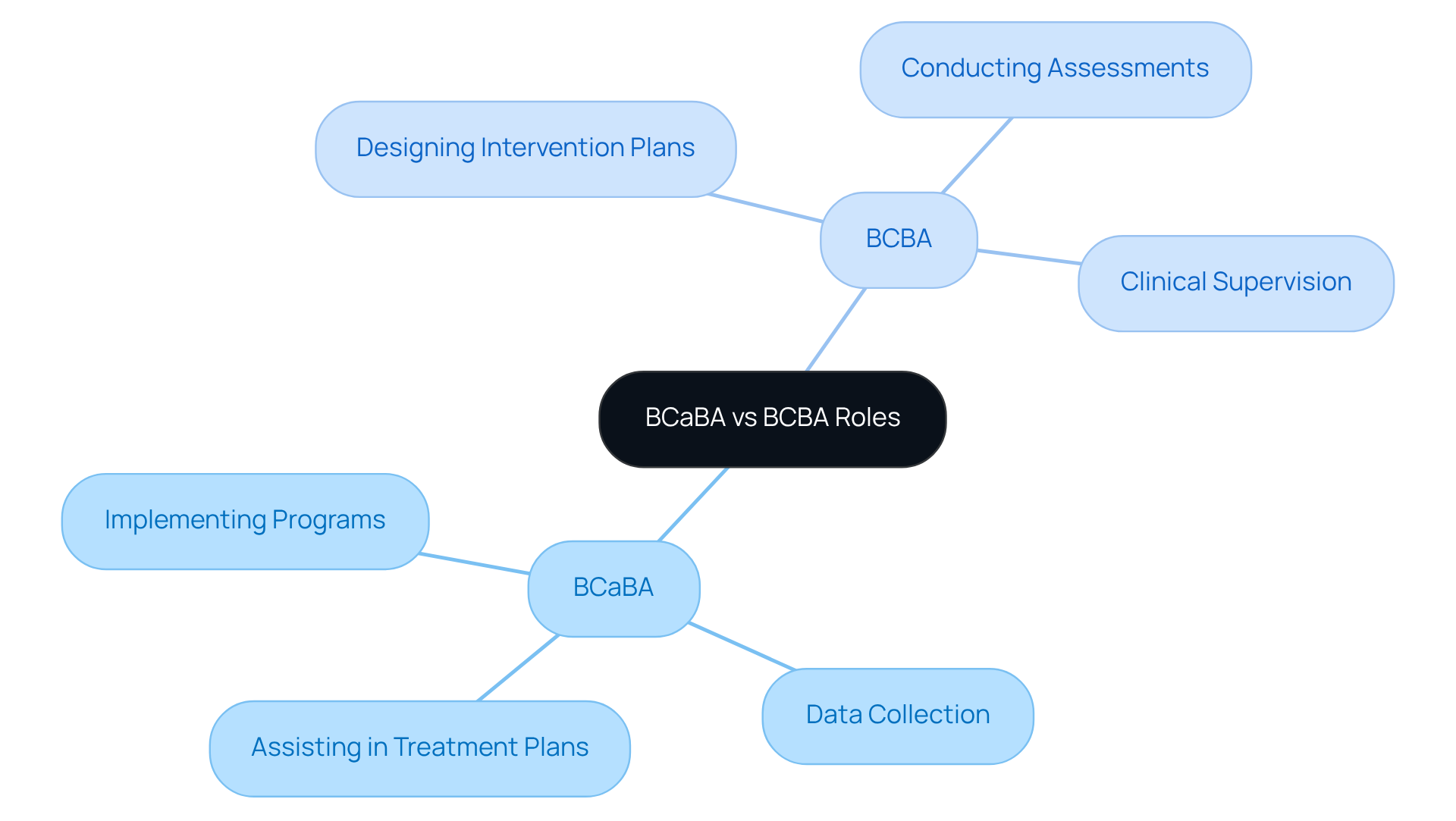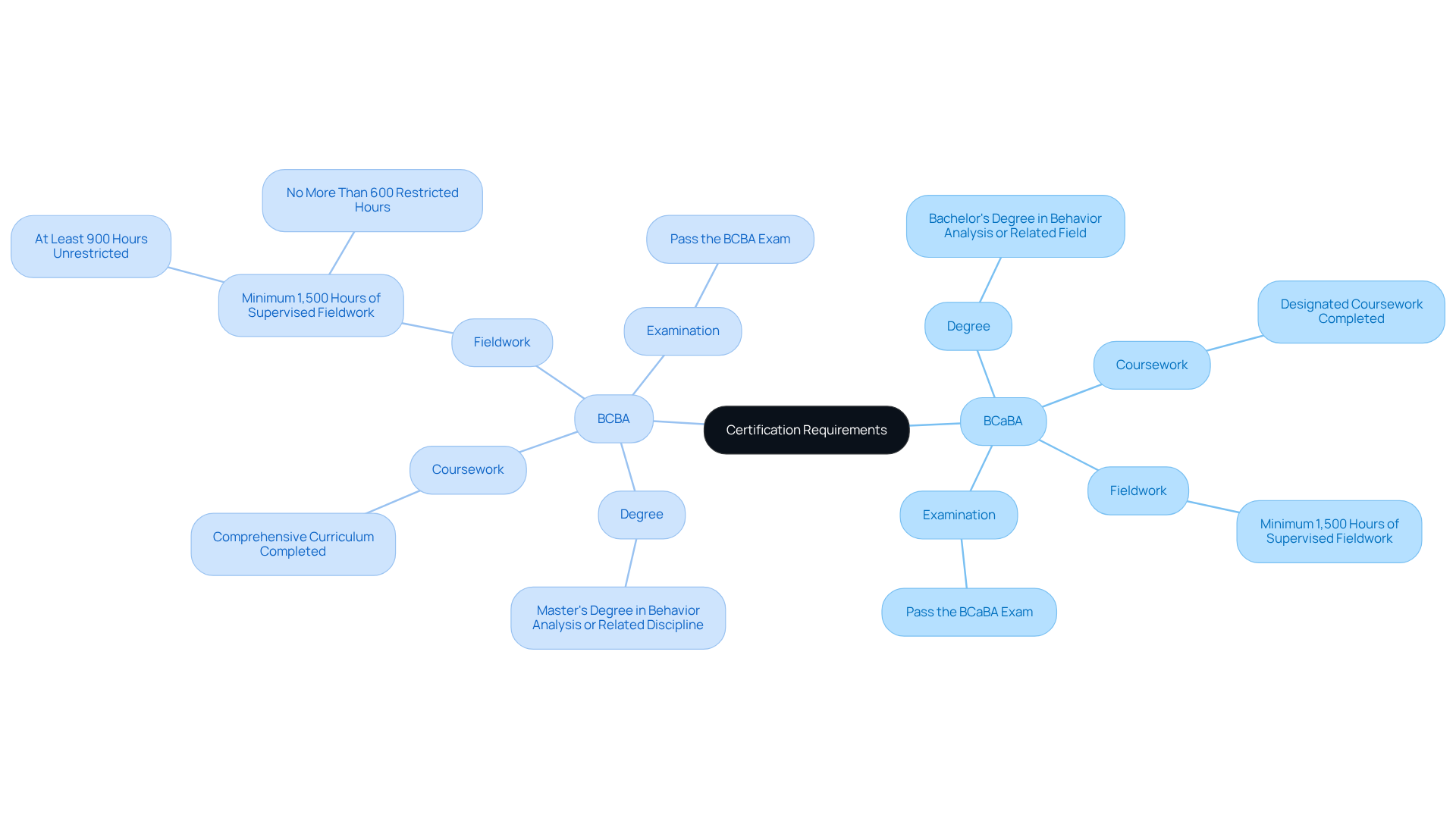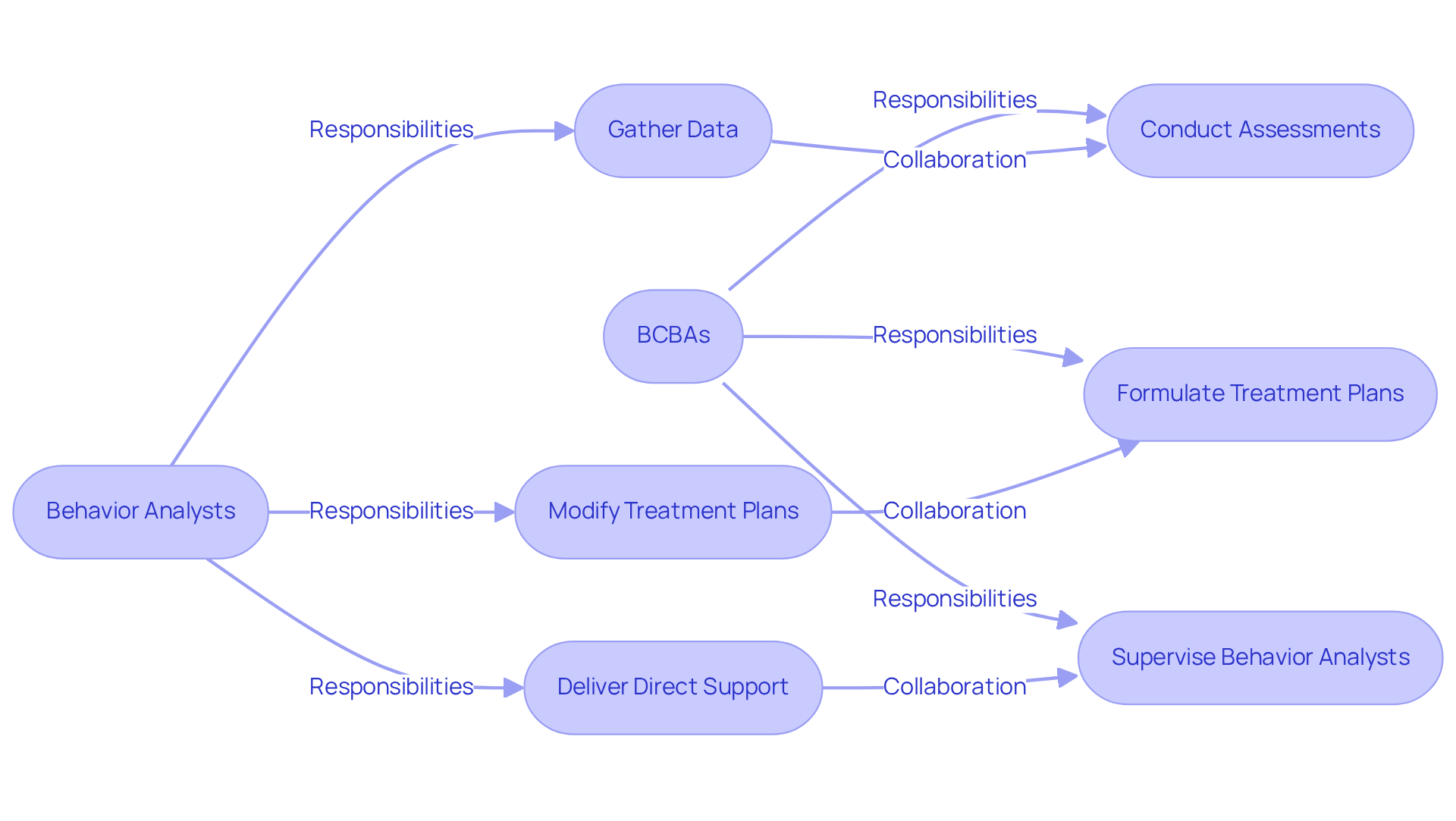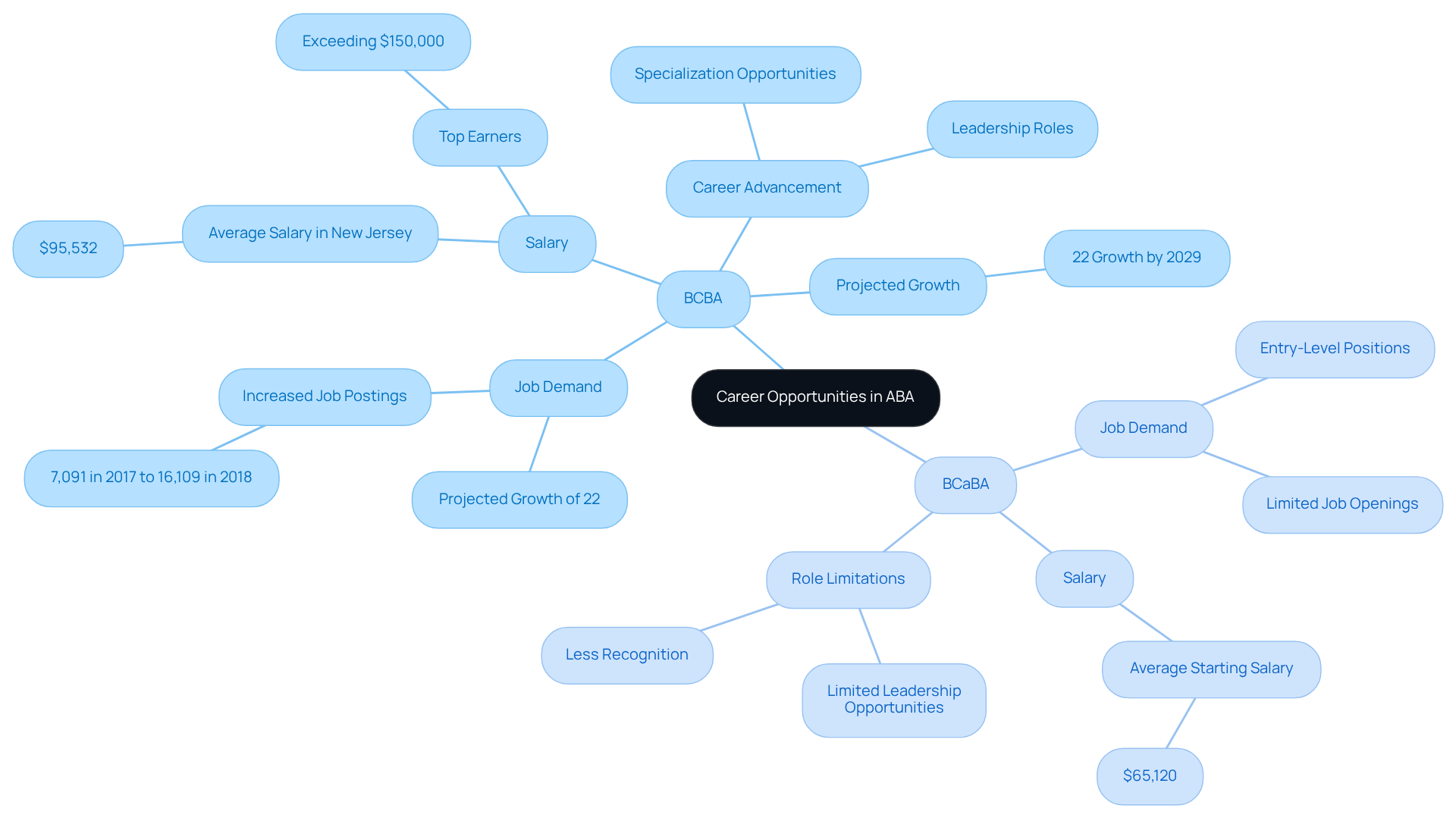September 4, 2025

The article "BCaBA vs BCBA: Key Differences in Roles and Career Paths" delineates the distinctions between Board Certified Assistant Behavior Analysts (BCaBAs) and Board Certified Behavior Analysts (BCBAs) regarding their roles, responsibilities, educational requirements, and career prospects.
Notably, BCaBAs play a crucial role in assisting with the implementation of behavior analysis programs under the supervision of BCBAs. In contrast, BCBAs are tasked with designing treatment plans and conducting assessments, underscoring a significant difference in expertise and job demand.
This disparity is further emphasized by the fact that BCBAs are experiencing a much higher growth trajectory within the field, reflecting the increasing need for their specialized skills.
As the demand for qualified professionals continues to rise, understanding these key differences becomes essential for those navigating career paths in behavior analysis.
The landscape of Applied Behavior Analysis (ABA) is evolving rapidly, underscored by a significant surge in demand for Board Certified Behavior Analysts (BCBAs) and their assistant counterparts, BCaBAs.
As the effectiveness of ABA therapy gains recognition, it is crucial for aspiring behavior analysts to understand the distinct roles and career trajectories of these professionals.
What are the key differences between BCaBAs and BCBAs?
How do these distinctions impact career opportunities and responsibilities in this growing field?
Exploring these questions reveals not only the essential functions each role serves but also the pathways to success within the dynamic world of behavior analysis.
The demand for Board Certified Behavior Analysts (BCBAs) is on the rise, with approximately 74,125 certified behavior analysts and 5,623 certified assistant behavior analysts in the United States as of early 2025. This significant growth underscores the essential roles that both the BCaBA and the BCBA have when considering the bcaba vs bcba dynamics in the field of Applied Behavior Analysis (ABA).
A BCaBA typically operates under the supervision of a BCBA, focusing on implementing behavior analysis programs, collecting data, and assisting in the development of treatment plans. Their contributions are vital in executing ABA interventions, as they may also provide direct services to clients.
In contrast, the responsibility level of a BCBA is higher when considering bcaba vs bcba. This includes designing and overseeing behavior intervention plans, conducting comprehensive assessments, and ensuring adherence to ethical standards. BCBAs are qualified to oversee assistant behavior analysts and other personnel, thereby taking on a broader function in leadership and clinical supervision. The increasing demand for both roles underscores the growing recognition of ABA's effectiveness in treating Autism Spectrum Disorder (ASD) and other behavioral challenges, particularly in discussions surrounding bcaba vs bcba. This demand emphasizes the significance of both BCaBAs and similarly trained professionals in delivering quality care and assistance to individuals with developmental disabilities.
At Hire ABA, we recognize the distinct qualifications and goals of behavior analysts. Are you facing challenges in hiring the right talent? Our personalized job matching solutions leverage advanced job fit scoring to identify opportunities that align with the skills, preferences, and desired locations of behavior analysts. From application to negotiation, we offer extensive assistance to ensure board-certified behavior analysts find positions that are ideally matched to them.

To qualify as a BCaBA, candidates must possess at least a bachelor's degree in behavior analysis or a related field, complete designated coursework, and successfully pass the examination that distinguishes BCaBA vs BCBA. In contrast, when comparing BCaBA vs BCBA, BCBA candidates are required to hold a master's degree in behavior analysis or a related discipline, undergo a more comprehensive curriculum, and accumulate a minimum of 1,500 hours of supervised fieldwork, with at least 900 of those hours being of the unrestricted type, before attempting the BCBA exam. This distinction in educational prerequisites highlights the varying levels of expertise and responsibility inherent in each position, particularly when considering the differences represented by BCaBA vs BCBA, with certified behavior analysts expected to demonstrate a deeper understanding of behavioral principles and practices. Candidates typically need to accrue about 20 hours of fieldwork each week to graduate in five semesters.
Programs with high pass rates for these exams often indicate effective curricula and robust support systems, enhancing the likelihood of student success and career advancement. The national first-time pass rate for the BACB exam has ranged from 55% to 65% over the past decade, highlighting the challenges candidates face. Furthermore, selecting a program with a strong track record of high pass rates can significantly impact a candidate's preparedness and future career opportunities, as emphasized in the case study on the importance of pass rates in behavior analysis programs.
Dr. Stephen Eversole notes that success on the BCBA® exam is best achieved when learners focus on meaningful discriminations, which is crucial for effective exam preparation.

Behavior analysts are essential in implementing behavior intervention plans crafted by certified behavior analysts. Their primary responsibilities encompass gathering data on client progress, aiding in the modification of treatment plans, and delivering direct support to clients. Conversely, Board Certified Behavior Analysts (BCBAs) are charged with conducting thorough assessments, formulating customized treatment plans, and supervising their execution. They also engage in training and overseeing behavior analysts and other staff, ensuring adherence to ethical standards throughout the therapeutic process.
This structured division of responsibilities fosters a collaborative approach to client care, where BCBAs provide critical oversight and guidance to BCaBAs, ultimately enhancing the effectiveness of interventions, particularly in the context of bcaba vs bcba. The significance of this collaboration cannot be overstated; studies reveal that children receiving ABA therapy exhibit substantial improvements in social and communication skills, with early intervention yielding even greater success.
Furthermore, the demand for behavior analysts is projected to increase by over 25% in the next five years, underscoring the importance of these roles in meeting the escalating need for ABA services. It is imperative for behavior analysts to remain vigilant about emerging opportunities, as the market is expanding with positions that offer elevated salaries, leadership roles, and flexible working conditions.

The demand for Board Certified Behavior Analysts (BCBAs) is soaring, significantly outpacing that for Board Certified Assistant Behavior Analysts (BCaBAs), highlighting the trend of BCaBA vs BCBA. This surge is largely attributed to the increasing recognition of Applied Behavior Analysis (ABA) therapy's effectiveness in tackling various behavioral challenges. Projections indicate that the need for BCBAs is expected to rise by approximately 22% by 2029, fueled by the expansion of ABA services across schools, clinics, and private practices.
As of 2023, over 40,000 Board Certified Behavior Analysts are practicing globally, underscoring the field's growth. While BCaBAs do have job openings, their roles are typically seen as entry-level, offering limited leadership opportunities when considering the differences in BCaBA vs BCBA certified behavior analysts. The demand for behavior analysts is illustrated by the dramatic increase in job postings, which surged from 7,091 in 2017 to 16,109 in 2018.
For individuals aspiring to a career in ABA therapy, obtaining BCBA certification not only enhances job security but also significantly broadens advancement potential within the field. Average salaries for BCBAs vary by state, with New Jersey offering an average of around $95,532, further emphasizing the financial advantages of pursuing this certification.
Are you facing challenges in hiring qualified BCBAs? Consider how Hire ABA can streamline your recruitment process and connect you with top-tier professionals in the field. With the robust demand for BCBAs, now is the time to act and secure the talent you need to enhance your practice.

The demand for Board Certified Behavior Analysts (BCBAs) is projected to increase by 22% by 2029, highlighting the urgent need for qualified professionals in the field of Applied Behavior Analysis (ABA). This growing recognition of ABA therapy's effectiveness, particularly in supporting individuals with Autism Spectrum Disorder (ASD), underscores the importance of understanding the distinct roles of Board Certified Assistant Behavior Analysts (BCaBAs) and BCBAs. While both positions are essential for delivering effective interventions, BCBAs take on a more advanced role, overseeing treatment plans and ensuring ethical practices, while BCaBAs implement these plans under supervision.
As the landscape of behavior analysis evolves, aspiring professionals must weigh their options carefully. Pursuing BCBA certification not only enhances job security but also opens doors to leadership roles, higher salaries, and greater career advancement. Are you currently facing challenges in hiring qualified behavior analysts? Engaging with resources like Hire ABA can streamline the recruitment process, ensuring that the expanding needs of the ABA field are met effectively.
Embracing the opportunities within this dynamic landscape can lead to fulfilling careers dedicated to making a meaningful impact in the lives of those served by ABA therapy. The time to act is now—consider how Hire ABA can facilitate your journey in this rewarding field.
What is the difference between a BCaBA and a BCBA?
A BCaBA (Board Certified Assistant Behavior Analyst) typically operates under the supervision of a BCBA (Board Certified Behavior Analyst). BCaBAs focus on implementing behavior analysis programs, collecting data, and assisting in the development of treatment plans, while BCBAs are responsible for designing and overseeing behavior intervention plans, conducting assessments, and ensuring ethical standards are met.
What are the main responsibilities of a BCaBA?
A BCaBA's main responsibilities include implementing behavior analysis programs, collecting data, assisting in the development of treatment plans, and providing direct services to clients under the supervision of a BCBA.
What are the main responsibilities of a BCBA?
A BCBA is responsible for designing and overseeing behavior intervention plans, conducting comprehensive assessments, ensuring adherence to ethical standards, and supervising assistant behavior analysts and other personnel.
Why is there a growing demand for BCBAs and BCaBAs?
The demand for both BCBAs and BCaBAs is increasing due to the growing recognition of Applied Behavior Analysis (ABA) as an effective treatment for Autism Spectrum Disorder (ASD) and other behavioral challenges.
What role does Hire ABA play in the hiring process for behavior analysts?
Hire ABA offers personalized job matching solutions that leverage advanced job fit scoring to help identify opportunities that align with the skills, preferences, and desired locations of behavior analysts, providing assistance from application to negotiation.
Our expert recruitment strategies and AI-driven sourcing ensure that you receive top-notch candidates quickly, without compromising on quality. Whether you’re looking for BCBAs, Clinical Directors, or RBTs, we’ve got you covered.